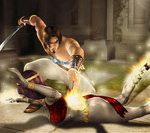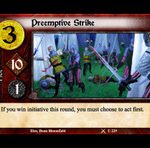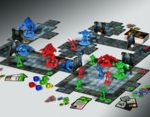Fretting the Player Character
Nick Montfort
Nick Montfort argues that the contentious notion of the "player character" usefully constrains and makes possible the player's interaction with the gameworld. He considers the possibility that in interactive fiction one plays the character (like an actor plays a role) rather than playing the game.
Enlightening Interactive Fiction: Andrew Plotkin’s Shade
Jeremy Douglass
Jeremy Douglass evaluates Shade within the history of interactive fiction, and considers how light is represented in the code structure of scene descriptions, arguing that "[w]ithout vision there is no agency."
Patterns and Shade
Carl McKinneyCarl McKinney argues that Jeremy Douglass's analysis of Shade suggests a presence/absence dynamic useful for understanding interactive fiction in general.
On The Archer’s Flight
Mark Keavney
Mark Keavney describes his process in composing a story in which the readers voted on plot points as he was writing, resulting in a truly interactive fiction - a narrative in which, as Keavney puts it, "[n]either the players nor I owned the story completely."
Dungeons, Dragons & Numerals: Jan Van Looy’s Riposte to Erik Mona
Jan Van LooyJan Van Looy criticizes Erik Mona's history of Dungeons & Dragons as overly descriptive, and Van Looy critiques the game's quantification of the qualitative, i.e., personal characteristics and magic - which were hitherto considered unquantifiable.
Writing Façade: A Case Study in Procedural Authorship
Michael Mateas
Michael Mateas and Andrew Stern argue that new media practitioners and scholars should be literate in the code that underlies their objects of creation and study. To this end, they explain how they structured the code of their computer-based interactive drama Façade, which capitalizes on the procedural nature of computers to create a forum for participatory drama that negotiates players' local and global agency within the game world.
The Sands of Time: Crafting a Video Game Story
Jordan Mechner
Jordan Mechner explains how the team developing of Prince of Persia: The Sands of Time incorporated a number of cinematic techniques such as flashback and voice over (which do not usually figure into video games) while also working within the practical restrictions of a commercial production schedule.
On The Breakup Conversation
Robert Zubek
Robert Zubek describes how his program takes advantage of the tropes of breakup conversations. These generic norms allow The Breakup Conversation to assess players' textual entries categorically rather than semantically and thereby convincingly simulates an IM-based interaction.
Deikto: A Language for Interactive Storytelling
Chris Crawford
Chris Crawford walks through Deikto, an interactive storytelling language that "reduce[s] artistic fundamentals to even smaller fundamentals, those of the computer: addition, subtraction, multiplication, and division."
GRIOT’s Tales of Haints and Seraphs: A Computational Narrative Generation System
D. Fox Harrell
D. Fox Harrell considers what is computational about composition, and describes the GRIOT system for generating literary texts.
On And Then There Were None
Lee Sheldon
Lee Sheldon describes his playable adaptation of Agatha Christie's And Then There Were None, which relies on his invention of a "suspicion meter" to quantify and track the player's interaction with - and assessments of - NPCs (non-player characters).
Between Acting and Narrating: Editors’ Introduction to “Tabletop Systems”
Pat HarriganThe electronic release of Second Person starts with a number of essays on tabletop role-playing. Most of these consider the entanglement of play and narrative in a variety of game systems, from the highly controlled to the largely open-ended.
Design Decisions and Concepts in Licensed Collectible Card Games
Eric Lang
Eric Lang (with Pat Harrigan) explains the advantages writers have in crafting adaptations of literary franchises into collectible card games. Lang maintains that, while attempting to remain true to the original, when turning narratives into games, one must "respect the medium."
One Story, Many Media
Kevin Wilson
Kevin Wilson describes his methodology of boiling a franchise down to its core elements and weighing the differences among media when translating games from medium to medium.